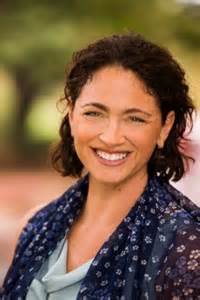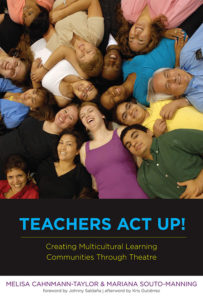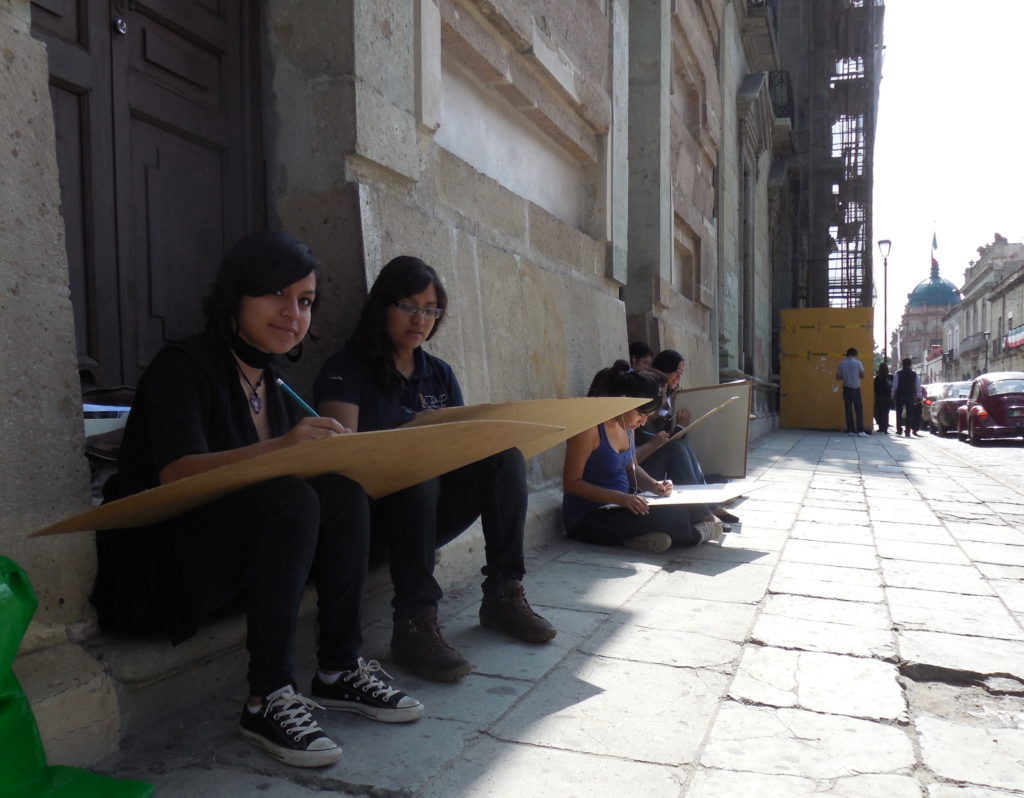The Anthropology/Poetry Nexus–An Interview with Melisa Cahnmann-Taylor
Can artists and social scientists inhabit the same universe?
Melisa (“Misha”) Cahnmann-Taylor embodies that nexus.
Her advanced degrees include an MFA in poetry . . . and a PhD in educational linguistics.
She’s published plenty of scholarly work in academic journals and books (about language learning, sustainable or fragile states of bilingualism, and teacher education) . . . and plenty of poems in literary journals.
She uses poetic and theatrical exercises to teach everyone from young children to future English language teachers.
Melisa Cahnmann-Taylor (in black, with hat) running a poetry program at an elementary school in Cajones, Mexico
Misha’s professional quest is to understand the complexities of U.S. bilingual education, second language teaching, and world language education . . . and, more broadly, the intersections between language, culture, identity, class, and power. She dubs her work, “scholARTistry,” which she sees as spanning linguistic, cultural, and disciplinary boundaries.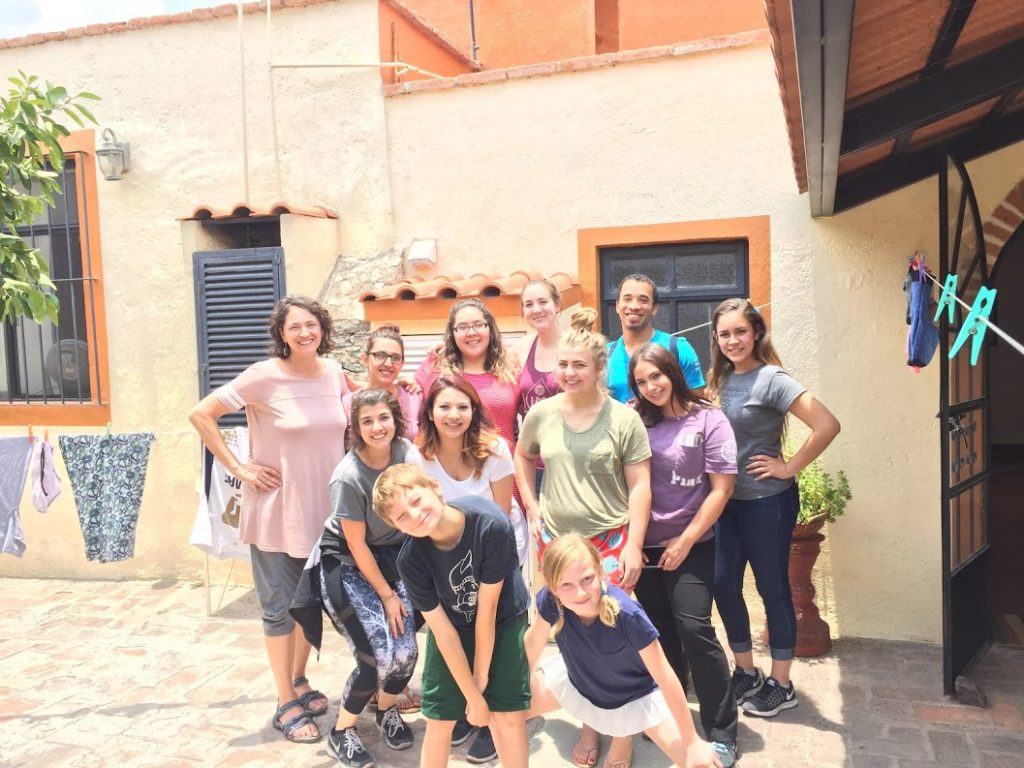
Melisa Cahnmann-Taylor (back row, left) celebrating writing bilingual and trans-lingual creative writing with participants in a workshop for students held in Guanajuato, Mexico; sponsored by the Richard Ruiz Residency Scholar Program (a fellowship program for scholar-artists through the U of Arizona Resplandor program)
Misha began her career as a bilingual (Spanish/English) elementary educator in south-central Los Angeles and went on to teach and conduct research among Latino/a communities in Chicago, Philadelphia, Boston, and Mexico City. She now works with bilingual youth and their families in Georgia, where she is Professor of Language and Literacy Education in the College of Education at the University of Georgia.
As a teacher, Misha seeks a humanistic approach–one that honors lived experience, and that cultivates the potential for cross-cultural dialogue and deep listening in and out of the classroom. Some of her pedagogical activities are inspired by Brazilian activist Augusto Boal’s development of a Theatre of the Oppressed. A book that Cahnmann-Taylor co-authored on Teachers Act Up! Creating Multicultural Learning Communities through Theatre explores the potential for theatre to inform teaching.
Misha also incorporates poetry at every level of teaching.
A student’s edited poem done in a workshop taught by Melisa Cahnmann-Taylor
Misha brings her creative approach to the classroom in training pre-service Teachers of English to Speakers of Other Languages [TESOL], foreign language teachers, and K-12 English language arts teachers. To these different constituencies, she offers a wide array of courses on topics ranging from Spanish-language children’s literature and bilingualism/bilingual education to theatre for reflective language teachers, poetry for creative educators, and trans-lingual memoir.
From her inspirational instruction, Misha received a national teaching award in 2015, the Beckman Award for Professors Who Inspire. In 2016, she directed her first National Endowment for the Arts “Big Read – Jeffers Program.”
A moment with Edgar Allen Poe, while Melisa Cahnmann-Taylor (center) directed her second Big Read-Jeffers Program for the National Endowment for the Arts
You can find Misha’s university webpage here and her Academia.edu page here. And you can follow her pedagogically oriented blog (Teachers Act Up–Thoughts on Teaching, Language, and Social Change) here.
One academic home that’s helped Misha unite the poetic and social scientific sides of her identity is the Society for Humanistic Anthropology. Having won the Ethnographic Poetry Award from their journal, Anthropology and Humanism, Misha is now Dell Hymes’ successor as poetry editor for the journal, and she judges their annual poetry contest. In her life as a poet, Misha has won a Leeway Poetry Grant in 2001 and the Dorothy Sargent Rosenberg Poetry Prize in 2005.
Her book, Imperfect Tense: Poems was recently published by Whitepoint Press (2016). 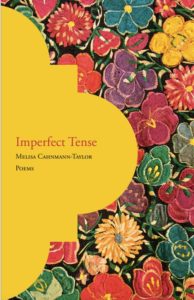
Many of the poems in this book reflect on what Cahnmann-Taylor learned while serving in 2013-14 as a U.S. Fulbright Scholar to Oaxaca (Mexico), where she researched American adults’ Spanish language acquisition. In a pre-publication assessment of the book, distinguished poet Thomas Lux wrote:
“These poems are about language and are brilliant evocations of what it is like to be human in a world that seems to make that more and more difficult. This is an original and powerful book.”
I recently interviewed Misha about Imperfect Tense. Have a read (AG = Alma Gottlieb; MCT = Melisa Cahnmann-Taylor):
*
AG: Given your training as a social scientist, why do you (also) write poetry?
MCT: One answer is that I was mentored and inspired–directly or indirectly–by creative scholars and anthropologists such as Ruth Behar, Renato Rosaldo, Fred Erickson, Nancy Hornberger, Ivan Brady, Gloria Anzaldúa, Augusto Boal, you, and others who maintained lives as creative people . . . and whose social science was better because of their engagement with music, image, metaphor, and vulnerability.
Equally true is that I write poetry because it’s how I’m built. I use the tools of an anthropologist to listen deeply, and see and process what I’m experiencing and what I’ve learned from others’ scholarship. I also use the tools in which I was trained as an artist. Metaphor, image, meter, rhyme, stanzaic structure–these aspects of craft and form help me shape what Robert Bly referred to as a “leaping consciousness,” one that is unafraid to go back and forth between the head and the heart. I can’t help but want to “feel” data and find the right words in the right order. With any luck, my poems may also help others feel the compressed complexity of human experience through lyric form.
AG: Does writing poetry also inform your ethnographic writing?
MCT: Only now, so many years after writing about “arts-based research” (culminating in a book I co-edited, Arts-Based Research in Education:Foundations for Practice), have I begun to defy separation between these two genres and look at them both as forms of “trans” writing–writing that’s often trans-lingual and trans-genre. Writing poetry has helped me clarify and claim my own voice as a poet scholar, or “scholartist”–one who wants to move away from tired explanations of method and theory.
That said, when I wrote my 2013-14 Fulbright application to study adult North Americans’ Spanish language acquisition in Mexico through poetry, I did so with trepidation, as well as a healthy dose of “conventional” methodology–interviews, planned participant-observation. I went into the field to collect ethnographic data much like any conventional anthropologist.
Observing Jonathan Blasi teaching Spanish to an adult American language learner in Oaxaca
But doing so as a poet, perhaps, also meant that I was open to the unconventional, that my fieldnotes and poetry notes intermingled, and that the ethnography study I might also write might never get written. The poems felt more accomplished than my ethnographic prose writing. That said, there was one interview that I found too big and too important to compress into a single poem or series of poems. This is why I took up ethnographic playwriting and wrote my first play. But I don’t think I’ll do that again because it requires a commitment to working with staged readings and theatre companies that I just don’t have. I didn’t realize it at the time, but I prefer poems because I can craft them virtually alone.
AG: Ha, yes, that’s probably something many poets might identify with.
Many of the poems in your new book have a “meta” foundation—they address different aspects of language itself, from being bilingual, or trying but failing to learn another language, to nuances of modal verbs and the Sapir–Whorf hypothesis. Can you talk about the grammatically-themed title to this collection—“Imperfect Tense”?
MCT: The title is a direct result of an interview with an English-speaking, American woman I met in Oaxaca, Mexico in her 60s who described her own painful process toward the never-ending goal of “fluency” in Spanish. Like many of those I interviewed, she was disappointed with traditional language classes for foreigners where verb tenses are taught in isolation. She told me how accomplished she felt when she could describe a film she’d seen all in the “imperfect tense” rather than in the present or fixed past–a tense that doesn’t exist in English. “The imperfect is so good for telling stories,” she said.
I got a chills as soon as she’d said it. That’s it! What we tell ourselves as language learners are all stories of imperfection–I’ll never know enough, I’m not a good enough student, I’m not native–all these negative messages we tell ourselves and others. These seemed to help me better understand the grit of those who study a second language in spite of the hardships–it’s a reckoning with permanent imperfection.
AG: I love that.
MCT: In putting together the book manuscript, I had poems from earlier phases of my life as a bilingual teacher, a bilingual daughter, and future aspirations as a bilingual mother. So the “past” and “ever-present” tenses seemed like good additions to the “imperfect” for drawing together different sections of the book and the poems that have composed my life.
I should add that I’m teaching a course now on “translingual writing” and work toward changing my language from describing “bilingualism,” implying two separate codes, towards translingualism or code-meshing. I’m grateful to Suresh Canagarajah for inspiring this movement. Translingualism helps me grapple with my own imperfect command of Spanish, English, Yiddish, and other codes that transgress my system.
AG: The notion of “translingual” writing seems especially apt these days, with so many conversations about “transgendered” identities.
At the same time, another set of poems in this book addresses mothering, child-rearing, and childhood.
A somatic statement on the politics of motherhood
The poem, “Mother Less, Mother More,” especially blew me away (and I love your dramatic reading of the poem, online here):
I can imagine that poem speaking to any mother, anywhere—no small feat. If you agree, would you still see this poem as ethnographic? Or do you think a poem must treat a culturally specific experience in order to qualify as “ethnographic”?
Melisa Cahnmann-Taylor with her daughter in Mexico
MCT: That is a very good question, and quite a compliment. That poem was published in a journal called “Mom Egg Review: Literature & Art” that targets mothers as its primary audience, so I was happy that this poem was showcased there. While its audience, if I’m lucky, may find it compelling to mothers in general, its trigger is partly personal (I have two small children ages 8 & 10), but also ethnographic. My training was in the Department of Educational Linguistics at the University of Pennsylvania founded by Dell Hymes. I was informed by many linguistic anthropologists, including Elinor Ochs and Shirley Bryce Heath, who drew my attention to the different ways language is used according to race, class, gender, age, and a host of other variables.
If I were restricting myself to terms current in linguistic anthropology now, I might replace “motherese” in the above excerpt with “caregiver speech” or “infant-directed speech.” But that’s head language and not poetry. And this is a poem, not ethnographic prose. Or is it?
I had poems informed by theory, by the many academic disciplines in which I was trained, and the permission that making art has given me to defy boundaries and write it! (a nod to Elizabeth Bishop’s “One Art”), anyhow. I trusted that coherence between individual poems would happen. It took quite a while, but the centering work of ethnographic fieldwork in Mexico gave me the backbone I needed to hold these varied language poems together in one book’s spine.
AG: They do hold together, even as another set of poems in this collection addresses your experiences with Judaism. Religion is a classic topic for anthropology. Why have you chosen the genre of poetry to write about it? Do you think there are things you can say about Judaism (or any other religion)—or ways to say it—that work better through poetry than through social science?
MCT: For me, the theme in this book is imperfection. Speaking a “standard language,” or becoming a “good mother,” or abiding by the tenets of one’s “religion”–these are all socially constructed roles which privilege an unattainable ideal. The poems are informed by interviews, participant-observation, library research, theory, and of course life experience. I would say that choosing to write religious poems was the choice made by my unconscious mind, a choice I might not have made had I restricted myself to writing only about my ethnographic focus of Spanish-English bilingualism.
AG: Can you compare your process of writing scholarly texts (including the research necessary ahead of time) with the process of writing poems (whether or not this ever involves “research” for you)? Any overlap, or are they two entirely different processes?
MCT: Earlier, I said that I am taking advantage of aging into a voice that isn’t one or the other but is always both. This may also be due to restrictions in the time I find I can spend doing extensive, planned fieldwork abroad, and to the increase in time I spend researching communities around me. Recently, I have been teaching poetry courses to international students enrolled in graduate-level TESOL programs [Teachers of English to Speakers of Other Languages]. They will return to their home countries to teach English, and I am teaching them to consider their own poetic voice and those of their future students.
Misha also incorporates drawing as a visual complement to writing in her pedagogy; here, students drawing on the streets of Oaxaca
Studying this process involved collecting data in the form of interviews, but also these students’ poems as well as my own poetic response to the shared educational experience. I am constantly searching for ways to merge my thinking and my poetic voice. Recently, I did this in a “manifesto” I wrote for a journal called Pedagogy and Theatre of the Oppressed Journal. I needed a new genre as a way to find language for grappling with #BlackLivesMatter as a white, female academic. Finding this journal and their open call for the “manifesto” form felt like finding a “home”–one I didn’t know existed but have been seeking.
AG: That “manifesto” genre is an unusual one for a scholar. Did having anthropologist-poet role models like the ones you mentioned earlier help give you courage to explore new writing styles?
MCT: I feel so “at home” when I meet members of this hybrid tribe. I began to find community through the Society of Humanistic Anthropology where I first met Dell Hymes in person and was awarded the ethnographic poetry prize so many years ago.

Melisa Cahnmann-Taylor receiving Ethnographic Poetry Award from Alma Gottlieb (president of the Society for Humanistic Anthropology), November 2003
Then I became a judge for this prize, and not long after, Ather Zia came to my attention. She was one of the prize winners, and she has been a dear companion and now co-judge ever since. Nomi Stone, Adrie Kusserow, and Dana Walrath are some of the many other poetic anthropologists I’ve met through various meetings, often organized by the late, great Kent Maynard who I will forever miss since his early passing.
I continue to be drawn to panels at AAA that address creative crossings and genre bendings. At this last year’s 2017 meeting, I met wonderful poets and poetic anthropologists through the This Anthro Life [podcast series] and the wonderful new Sapiens [blog] from Wenner Gren. I’m also newly connecting with ethnographic songwriters like Kristina Jacobsen, as well as with ethnographic fiction writers and ethnographic dancers. My new heroes are often younger than I am, pushing and changing the field, daring to do things that might have felt impossible or taboo to do earlier.
AG: What’s next? More poetry? More anthropological writings? Both?
MCT: I just came out with a second edition of my co-edited book on “arts-based research” as I continue to articulate what it means to create new transdisciplinary work spaces that sit between the social sciences and the arts. I keep my creative writing alive, and I am open to more poems as well as finding new spaces for trans-genre writing that is both empirical and aesthetic.
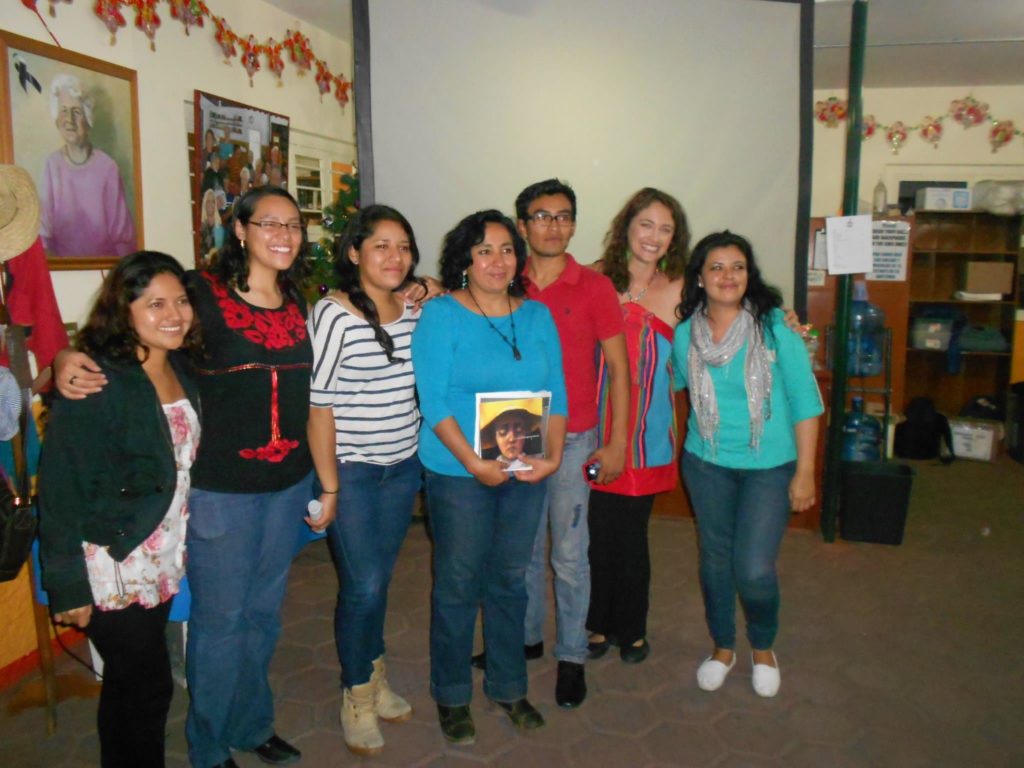
Melisa Cahnmann-Taylor (second from right) leading students and colleagues from the Autonomous University of Oaxaca at a poetry reading at the Oaxaca Lending Library
Finally, I am still doing some conventional qualitative inquiry, especially as I mentor students. It’s very important to me not to lose touch with the nuts and bolts provided by theory and ethnographic research design.
AG: As a scholar-poet, have you found a space in the academy that accommodates that dual career? Or, do you bifurcate these parts of your life into two separate career tracks? Based on your own experience, how would you advise young scholar-poets to construct their professional lives in the present moment of the academy?
MCT: In the last chapter of our new book, Arts-based Research in Education, I answer this question. I am tired of bifurcation and am teaching new generations of students to defy binaries. They push and pull, and I push and pull back, and this is happening in different ways in creative writing, the arts, and social sciences both in the U.S. and around the world. Based on my experience, I train students to strive to do “double”–to train in conventional research methods and theory as well as in poetry or other creative genres, and discover ways they can fuse them. In this way, they can play more than one game, to be able to get through the dissertation process and find a job in various possible homes.
But I feel I have a lot to learn from daring and younger scholars who won’t necessarily seek or find the same kind of academic jobs I was prepared for, and that I uphold. Based on my experience, I encourage younger “scholartists” to take my advice . . . but I know that only 50% or less will be relevant for them, their particular identity, and the new market in which they find themselves. To be relevant means to be present in the moment as you learn all about what has come before. My job is to nurture confidence and humility, and try to exercise those skills myself as my students continue to teach me about unknown futures. The poet in me tries to train the pedagogue to share what I have learned, but also to invite students to surprise me with what they know or can newly conceive.

